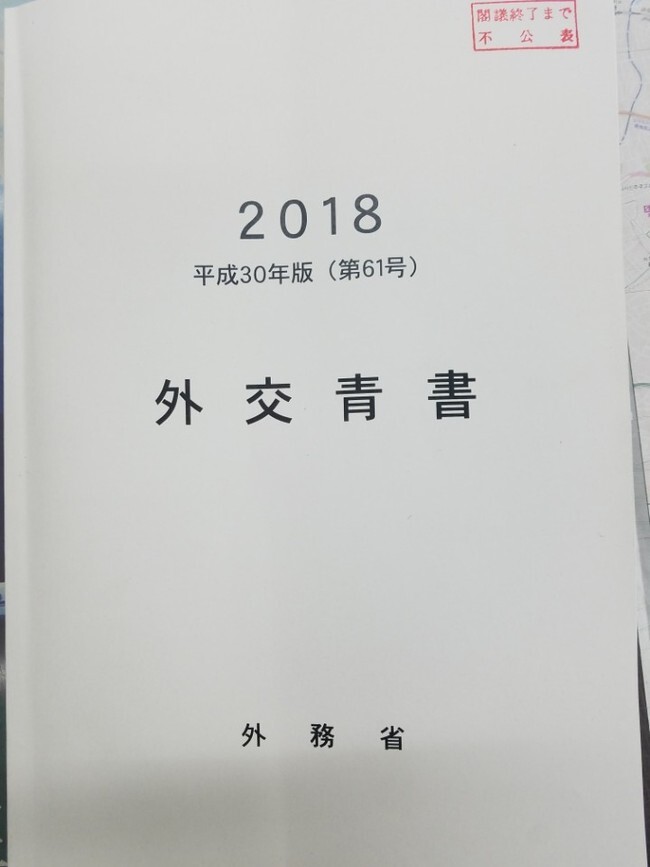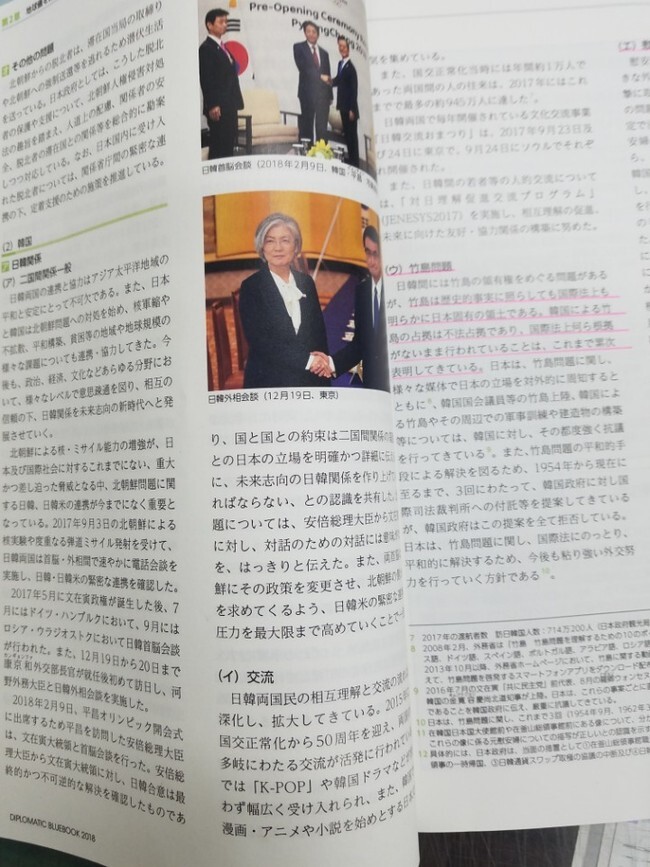hankyoreh
Links to other country sites 다른 나라 사이트 링크
Japan sharpens hardline language about Korea in foreign policy report

There was a noticeable increase of hardline language in the 2018 Diplomatic Bluebook released by the Japanese government on May 15, including the statement that the “Sea of Japan” is the only term with international legal standing for the body of water known in Korea as the “East Sea.” The Diplomatic Bluebook is a report by Japan’s Foreign Ministry that proposes foreign policy directions for Japan while taking into account how the diplomatic landscape around Japan changed during the previous year.
Phrases on several topics shored up Japan’s one-sided claims and downgraded its relations with South Korea. This year’s edition of the bluebook omitted the phrase “South Korea is our most important neighbor” and only said that “Solidarity and cooperation between South Korea and Japan is indispensable for the peace and stability of the Asia-Pacific region.”
South Korea’s “demotion” began in 2015, when the oft-repeated phrase “a neighboring country that shares basic values such as freedom, democracy and human rights” was deleted from the bluebook. Since 2016, Japan had used the phrase “the most important neighboring country that shares our strategic interests” to argue that Japan and South Korea ought to strengthen military cooperation to counter the threat posed by North Korea and China.
This year, however, even that language was removed. In his policy speech this past January, Japanese Prime Minister Shinzo Abe did not use the phrase “the most important neighboring country that shares our strategic interests.”
Japan’s claim to sovereignty over the island of Dokdo (called Takeshima in Japan) has become even harsher. Along with the recurring phrase “Takeshima is Japan’s sovereign territory,” this year Japan added the statement “South Korea’s occupation is illegal,” which it had not used in previous years.

The bluebook also responded to South Korean President Moon Jae-in’s statement that “the comfort women issue was not resolved by the Dec. 28 agreement” by saying that “requests for additional measures are completely unacceptable.”
In regard to China, on the other hand, the bluebook emphasized an improvement in bilateral relations: “This has been a year when the mood in China-Japan relations has improved considerably, with brisk dialogue at a high level, including government leaders and foreign ministers.” The report also said that North Korea’s nuclear weapons and missiles are “a grave and imminent threat to the peace and stability of Japan and the international community such as we have never seen before. We will put increase pressure on North Korea as much as possible.”
The South Korean government lodged a complaint about the bluebook. “We strongly protest the Japanese government’s repeating its inappropriate territorial claims about Dokdo, which is South Korea’s sovereign territory, in Japan’s Diplomatic Bluebook, and we strongly demand that this be retracted immediately. Repeating these inappropriate and absurd claims about Dokdo is not helpful at all for building forward-looking relations between our two countries,” said Noh Kyu-duk, spokesperson for South Korea’s Ministry of Foreign Affairs, in a statement on May 15.
Kim Yong-kil, Director-General for Northeast Asian Affairs at South Korea’s Foreign Ministry, summoned Koichi Mizushima, minister at the Japanese Embassy in Seoul, to the Foreign Ministry building on Sejong Street in Seoul to protest the affair. Noh said that Kim had “made clear that we could also not accept Japan’s inappropriate claim about the name of the East Sea and emphasized that the East Sea is a legitimate name that has been used in South Korea for more than two millennia.”
By Cho Ki-weon, Tokyo correspondent, and Kim Ji-eun, staff reporter
Please direct comments or questions to [english@hani.co.kr]

Editorial・opinion
![[Column] Park Geun-hye déjà vu in Yoon Suk-yeol [Column] Park Geun-hye déjà vu in Yoon Suk-yeol](https://flexible.img.hani.co.kr/flexible/normal/500/300/imgdb/original/2024/0424/651713945113788.jpg) [Column] Park Geun-hye déjà vu in Yoon Suk-yeol
[Column] Park Geun-hye déjà vu in Yoon Suk-yeol![[Editorial] New weight of N. Korea’s nuclear threats makes dialogue all the more urgent [Editorial] New weight of N. Korea’s nuclear threats makes dialogue all the more urgent](https://flexible.img.hani.co.kr/flexible/normal/500/300/imgdb/original/2024/0424/7317139454662664.jpg) [Editorial] New weight of N. Korea’s nuclear threats makes dialogue all the more urgent
[Editorial] New weight of N. Korea’s nuclear threats makes dialogue all the more urgent- [Guest essay] The real reason Korea’s new right wants to dub Rhee a founding father
- [Column] ‘Choson’: Is it time we start referring to N. Korea in its own terms?
- [Editorial] Japan’s rewriting of history with Korea has gone too far
- [Column] The president’s questionable capacity for dialogue
- [Column] Are chaebol firms just pizza pies for families to divvy up as they please?
- [Column] Has Korea, too, crossed the Rubicon on China?
- [Correspondent’s column] In Japan’s alliance with US, echoes of its past alliances with UK
- [Editorial] Does Yoon think the Korean public is wrong?
Most viewed articles
- 1[Column] Park Geun-hye déjà vu in Yoon Suk-yeol
- 2Thursday to mark start of resignations by senior doctors amid standoff with government
- 3N. Korean hackers breached 10 defense contractors in South for months, police say
- 4[Editorial] New weight of N. Korea’s nuclear threats makes dialogue all the more urgent
- 5Will NewJeans end up collateral damage in internal feud at K-pop juggernaut Hybe?
- 6Kim Jong-un expressed ‘satisfaction’ with nuclear counterstrike drill directed at South
- 7[Editorial] Japan’s rewriting of history with Korea has gone too far
- 8[Column] ‘Choson’: Is it time we start referring to N. Korea in its own terms?
- 9[Cine feature] A new shift in the Korean film investment and distribution market
- 10[Column] The clock is ticking for Korea’s first lady